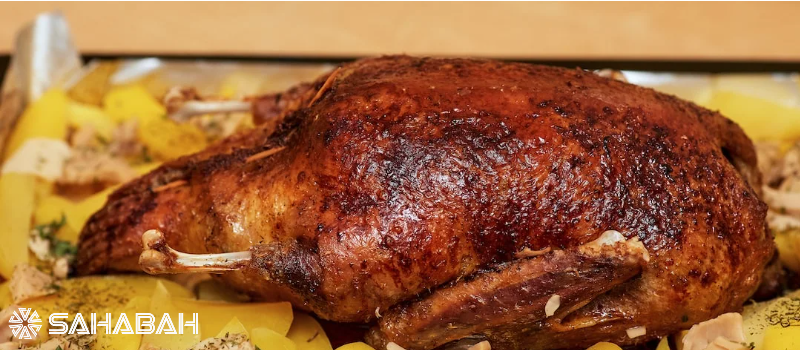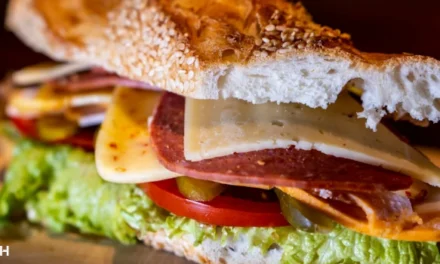Leon, known for its flavorful rotisserie chicken and sides, has grown into a staple for families and professionals across the UK. With hundreds of branches nationwide, many muslims wonder: Is Leon Halal?
For Muslims seeking halal meat options when dining out, the answer is more nuanced than a simple yes or no. While Leon has no official halal designation, some menu items may still suit religious needs.
What Constitutes Halal Food?
To understand if Leon qualifies under Islamic law, we must first define halal food standards:
Halal is an Arabic word meaning “permissible” or “lawful” under Islamic guidelines provided in the Qur’an. For a food or beverage to be considered halal, it must meet certain requirements around both its source and preparation:
-
Permitted Animals: Halal foods can only come from certain animal species slaughtered according to particular methods. Cows, lamb, chickens, turkeys, goats, game animals, fish and seafood all qualify as halal sources of meat protein under Sharia law. Meanwhile, the consumption of pork and meat from carnivorous animals or birds of prey are strictly prohibited for Muslims.
-
Slaughter Method: For red meat and poultry to be halal, the animal must be conscious when killed. The traditionally prescribed method is a single deep cut across the neck with a sharp knife to sever the carotid artery, windpipe and jugular veins. As the blood swiftly drains, the animal experiences a rapid death without unnecessary suffering. While bleeding the animal out, the slaughterer must invoke the name of Allah over each animal and declare a prayer to bless the animal.
-
Other Restrictions: Beyond meat sourcing and preparation guidelines, halal foods must adhere to several other standards. This includes never containing or contacting certain forbidden ingredients like pork, alcohol or other foods deemed impure under Islamic law. Foods cannot be prepared using untensils or surfaces that have previously handled non-halal items until they have been washed according to specific cleansing rituals. Cross-contamination with any forbidden substances invalidates a food or restaurant’s halal status.
By following these guidelines around approved meat proteins, humane slaughter practices, exclusion of forbidden ingredients and prevention of contamination by impure substances, restaurants can qualify to earn official halal certification from accredited authorities. This allows them to display halal trademarks assuring Muslim patrons their offerings meet Qur’anic standards enabling followers of Islam to consume them.
Does Popular UK Chain Leon Have An Official Halal Designation?
Leon, despite operating hundreds of eateries across Britain, does not currently possess recognized halal certification to reassure Muslim consumers that their food handling protocols comply fully with the code set forth for Islamic diets.
The company has no registered halal authorities auditing their supply chains, ingredients or preparation procedures for adherence to Sharia principles. Nor do they display symbols of accreditation from any approved global or local halal certification bodies attesting to complete alignment with halal standards at each franchise location.
Why Leon Lacks Halal Certification
Leon likely does not pursue formal halal verified status due to the costs and complexities meeting all requirements would necessitate given their diverse suppliers, menus and kitchen protocols across such a vast enterprise:
-
Implementing verified approved slaughter methods for all meat items company-wide would prove extremely challenging logistically and financially. Monitoring every meat source, abattoir and processing facility in real time continually would strain resources.
-
Eliminating cross-contamination by separating and designating halal-only surfaces, utensils and fryers during prep would disrupt operational flows in kitchens lacking excess capacity. It would also slow service speeds.
-
Reliably preventing any contact between halal and forbidden ingredients like pork across all menu items and franchises cannot be fully guaranteed given invoices scale and diversity.
-
Having to wash and bless certain equipment between handling divergent ingredients complicates staff training and kitchen layouts negatively impacting productivity.
In summary, lacking halal certification enables Leon to minimize costs while maximizing flexibility across a mutable sprawling supply and distribution network. But this leaves Muslims with uncertainty regarding whether consuming menu items adheres to religious tenets or not when dining.
Can Muslims Consume Food at Leon? Performing Your Own Halal Audit
Despite no universal halal designation from Leon as a corporation, patrons trying to follow Islam’s dietary code can determine personally if certain menu options meet their individual standards through an independent audit:
Examine Specific Menu Items
Evaluating individual dishes based on their specific components provides more insights than blanket judgement of all offerings equally:
Boneless Rotisserie Chicken
- As poultry, chicken remains a permitted base protein. But with no verification of slaughter methods from suppliers, the meat may not comply with zabiha rituals.
- Frequent cross-contamination probable from shared surfaces and fryers that handle non-zabiha poultry and meats.
Plant-Based Options
- Leon Chick’n Nuggets made from pea protein could qualify as halal.
- But prepared alongside real Leon chicken items, exposure risks exist.
Sides & Salads
- Fries or slaw made with vegetable-based oils rather than animal fats may be considered halal depending on tools used.
- Produce-based salad options often lack additional non-halal components. But some dressings could disqualify them depending on ingredients.
No Alcohol or Pork
Menu devoid of dishes directly containing alcohol or pork. But cross-contact contamination from storage, prep and serving alongside non-halal menu items remains probable across all categories.
Inquire About Preparation Policies
Diners uncomfortable relying solely on ingredient labels can directly inquire with staff regarding specific store policies, practices and supplier relationships that may provide additional clarity:
- Ask if certain menu items arrive pre-slaughtered according to verified zabiha rituals.
- Request foods be made without invalidating ingredients like alcohol, pork or non-halal meat fats if customizable.
- Query whether separate halal prep areas, tools or protocols exist to prevent cross-contamination with forbidden menu items during handling.
This allows patrons to gather details for their personal judgement beyond basic static menu descriptions provided.
Customize Orders Judiciously
For dishes with modifying flexibility, customers can tailor items by omitting problematic ingredients to align better with halal diet principles:
- Hold mayonnaise or other dressings likely containing traces of alcohol from absorption during fermentation processes of acids and vinegar.
- Substitute vegetable oils for beef tallow or animal-derived frying fats.
- Eliminate cheese or butter from menu items to remove animal enzymes and preservatives.
Excluding such elements means the final plate contains exclusively certified halal components you know comply fully with Qur’anic injunctions.
Who Determines If Consuming Leon Food is Halal? Individual Diners Must Decide
Unfortunately without either blanket halal handled assurances or guaranteed transparency from Leon on a granular level, the ultimate determination regarding whether dining at Leon aligns with Islamic legal permissions comes down to each Muslim patron assessing their own standards against the information available to them individually.
Every person must weigh metrics ranging from verifiable halal meat sourcing, potential cross-contamination risks during storage and handling to modifications possible based on ingredient breakdowns and staff guidance.
Spectrum of Permissibility Perspectives
Perspectives on the permissibility spectrum regarding Leon for Muslims span from:
-
More Lenient: Given the ample vegetarian, seafood and modification potential, Leon offers reasonable ability to obtain halal meals. While uncertain, overall likelihood of substantial contamination seems relatively low if selecting salad, plant-based and unbreaded items prepared fresh without dressing. Dining there in moderation remains viable.
-
More Strict: With no verified oversight on precise meat and poultry slaughter methods nor certified protocols preventing co-mingling with forbidden menu substances, patronizing Leon violates halal integrity. Even if selections seemfacially compliant at first glance, the pervasive risk of exposure to inappropriate ingredients through processing, prep and service channels forbids eating there.
-
Middle Ground: Opting for vegetable-based, seafood or customized egg/dairy-free selections could enable moderately observant Muslims to eat at Leon occasionally if they are comfortable with the basic alignment to general halal standards. But more devout followers concerned about potential traces of cross-contamination may still conscientiously object.
Ultimately each Muslim holds sole responsibility for deciding where on this spectrum Leon’s offerings fit their personal interpretation of halal correctness and purity.
How Can Muslims Determine If Leon Meets Their Halal Standards?
Below are steps inquisitive diners can take to best evaluate if frequently patronizing Leon suits their religious needs:
-
Study the Full Parameters – Carefully examine which guidelines constitute proper halal protocols under Qur’anic doctrines you follow related to meat, slaughter, contamination, alcohol etc.
-
Compare to Leon’s Policies – Research available supplier, ingredient sourcing and preparation policies Leon publishes. How do they align with halal standards? Where are gaps?
-
Inquire With Local Locations – Directly ask staff at your nearest franchises about relevant halal-related protocols like meat suppliers used, handling procedures etc. to address omissions publicly stated policies leave.
-
Determine Personal Threshold – Given the data gathered, decide where you individually draw the line on purity factors regarding meat denied appropriate slaughter blessings, potential alcohol residue exposure etc. to forbid consumption or not.
-
Modify Orders Minimizing Compromises – If dining there, choose menu items aligning best with halal diet and customize further by removing additional problematic ingredients.
Regularly repeat this process checking if any supplying or handling policy changes impact assessments over time as you continue deciding whether to eat at Leon routinely or not based on your religious thresholds.
Frequently Asked Questions – Is Leon Halal
Leon is known for its halal offerings and is considered a halal restaurant by many customers.
Does Leon serve halal meat?
Yes, Leon serves halal meat at select locations, and it is clearly mentioned on the menu when halal meat is available.
What halal options are available on the menu at Leon?
Leon offers a variety of halal food options, including halal chicken, vegetarian and vegan dishes, and more. They aim to provide halal options for Muslim customers.
Is it safe for Muslims and people seeking halal food to eat at Leon?
Leon takes halal requirements seriously and strives to cater to the Islamic market by offering halal options and ensuring clean preparation processes to avoid contamination.
How does Leon certify their halal products?
Leon follows a strict halal certification procedure for its halal products, ensuring that the halal meat and other offerings comply with Islamic dietary laws.
Does Leon deliver halal food to locations across the UK?
Yes, Leon provides halal food service across various locations in the UK, aiming to cater to the diverse halal consumer base in the country
Conclusion
Leon lacks official certification validating complete halal supply chain and handling compliance across all 400+ British outlets. But with care around protein sources, sterilization and cross-contamination vigilance, certain seafood, plant-based and modified customizable offerings may still enable individual Muslims to dine at this popular chicken-centric chain without violating their personal interpretations if they do their due diligence.
The burden lies upon each diner to decide where on the permissibility spectrum Leon’s offerings land for them after weighing the likely integrity levels of ingredients, preparation and service methods against explicit Qur’anic injunctions dictating appropriate consumption.
No universal definitive answer exists on Leon’s halal status. The layered complexity around critiquing meat origins, potential exposure to alcohol traces and inevitable processing variability means every patron must conduct their own thorough impact assessment to determine clear personal parameters and act accordingly.
For Muslims seeking permissible halal chicken in particular, Leon remains a grey area with reasonable customization options but also risks of contamination requiring judicious selection. By arming themselves with a comprehensive understanding of both halal food regulations in Islam and the realities of Leon’s operating conditions, followers of the faith can each make discerning choices about whether to eat at this informal, budget-friendly British dining brand or not while honoring their creed.





